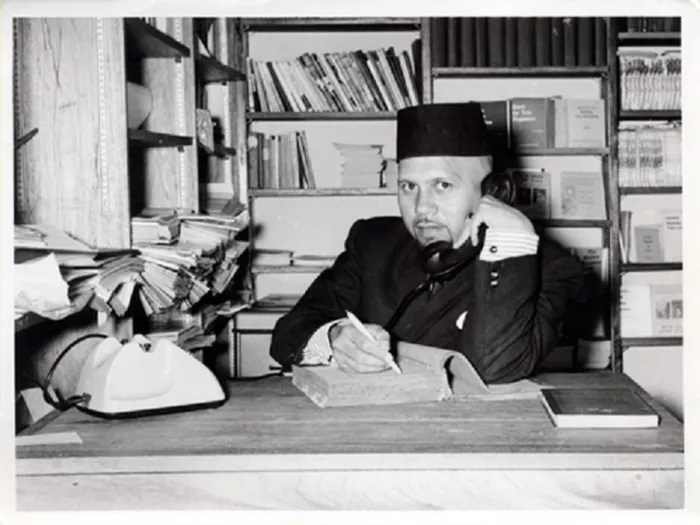Apartheid police killed Imam Haron, rules judge

The late Imam Abdullah Haron.
Struggle cleric Imam Abdullah Haron was killed by the apartheid state’s security police, a reopened inquest into his death in detention has found.
On Monday, Western Cape High Court Judge Daniel Thulare ruled that Imam Haron's death was the result of injuries sustained by torture by the apartheid police’s Security Branch.
Judge Thulare overturned the 1970s inquest ruling that had exonerated the Security Branch.
Imam Haron, 45, a respected leader in the Muslim community and a former editor of the Muslim News, died on September 27 1969 after 123 days in police detention at Caledon Square and Maitland police stations.
According to the Truth and Reconciliation Commission’s Final Report, he was suspected of recruiting PAC members and held under the Terrorism Act. Police claimed his death was the result of him losing his balance and falling down some stairs, and a later inquest attributed his cause of death to myocardial ischaemia, due in part to “trauma superimposed on a severe narrowing of a coronary artery” and “a substantial part of the said trauma was caused by an accidental fall down a flight of stone stairs”.
The TRC report noted that while it could not reverse the findings of that inquest, Imam Haron’s detention without trial “was undoubtedly a gross violation of human rights, and his death was caused directly or indirectly by his experiences at the hands of the security police”.
Judge Thulare’s ruling this week, more than 50 years after the cleric’s death, basically confirms the TRC’s findings and Imam Haron’s family’s long-held belief that he was killed.
And the judge named the killers: Lieutenant Colonel Carel Pienaar, Major Dirk Kotze Genis, Major Kotze, Captain Ebanis Geldenhuys, Sergeant Johannes “Spyker” van Wyk and Sergent Andries van Wyk. All six are deceased.
“They caused him the injuries under torture. This also explains why they individually and collectively participated in an attempt to cover up the torture and the true cause of death,” Judge Thulare said.
“It is the trauma suffered between 17 and 19 September that worsened his condition. This worsened condition was known to the Security Branch members at SAPS in Maitland. The six members of the Security Branch individually or collectively continued to hit and kick the imam... even when he lay helpless, sedated and in pain in the last few days of his lifetime.”
Judge Thulare criticised Magistrate JSP Kuhn who had exonerated the Security Branch saying, “The uncritical acceptance of the improbable version of the Security Branch cannot be supported ... The magistrate accepted without question the mere say-so of the Security Branch. He paid no heed to the cause (and) did not apply his mind to the evidence of the medical experts.”
Referring to the doctors who gave evidence in the initial inquest, he said: “The conduct of Dr Viviers, Dr Gosling, Dr Kosseaw, and Dr Schwar deserve serious rebuke from the court and is referred to the South African Medical and Dental Council for its attention.”
The daughter of Imam Haron, Fatiema Haron-Masoet, said the ruling had brought some closure to the family.
“We as a family always knew that he was killed, though now with the court rulings, it is on record and when future generations learn about my dad, they will know the truth."
Ms Haron-Masoet said her father had left an inspiring legacy for the nation.
“He was someone that always wanted to ensure that we live in a country where everyone is treated with dignity, everyone has the right to access to education and that we live in a just and fair society."
The family had finally received justice after 54 years, but justice remained elusive for the families of other freedom fighters, she said.
“Most of their cases were not heard or investigated and we have all gotten to know the different families over the years, and we will continue to support each other."
National Prosecuting Authority (NPA) spokesman Eric Ntabazalila said the judgment was the result of the NPA’s commitment to pursuing priority Truth and Reconciliation Commission cases.
“The NPA will implement the required measures to ensure accountability for TRC matters, despite the regrettable delays stemming from past inaction,” he said.
In 2019, the Al-Jaamia mosque in Claremont, where Imam Haron served, and his grave in Mowbray were both given a Heritage Western Cape plaque, identifying them as provincial heritage sites (“The life of Imam Haron celebrated,” Southern Suburbs Tatler, October 31, 2019)
His wife, Galiema Haron, died at the age of 93, in 2019. - Additional reporting by the Cape Times.
